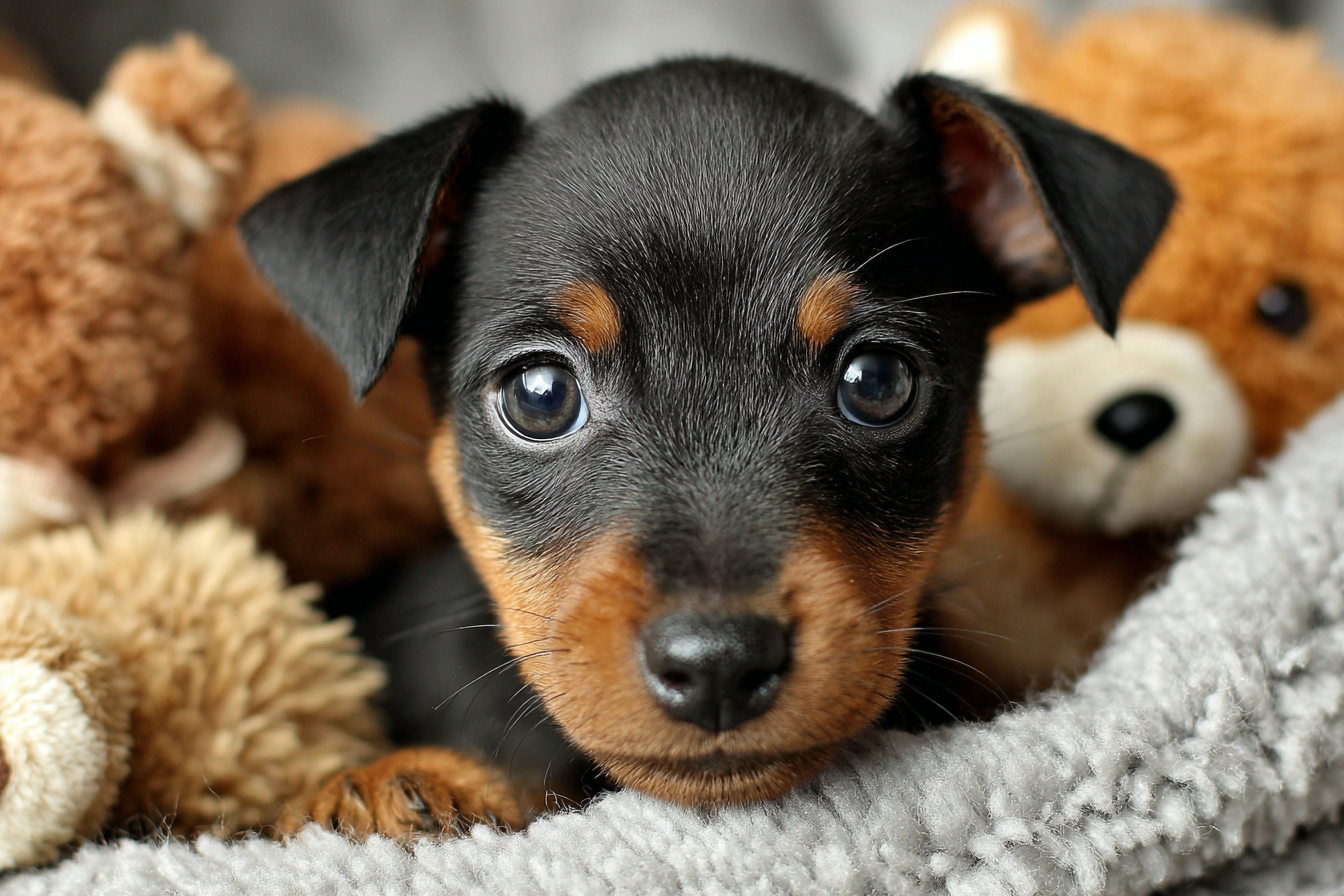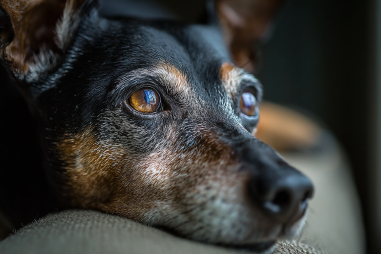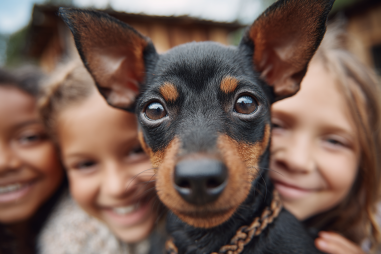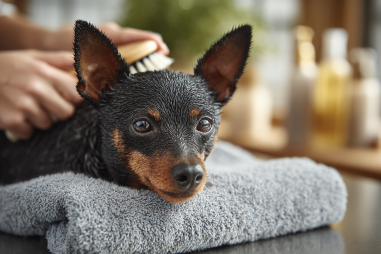Welcoming a Miniature Pinscher puppy into your home is an exciting journey filled with joy, love, and responsibility. These small but spirited dogs bring lots of energy, intelligence, and affection. To help your new furry friend thrive, it’s important to understand their unique needs right from the start. From preparing your living space and focusing on proper nutrition to socialization and grooming, this guide covers essential care tips for raising a healthy Miniature Pinscher puppy.
Preparing Your Home for a Miniature Pinscher Puppy
Before bringing your Miniature Pinscher puppy home, it’s important to create a safe and welcoming environment. These pups are energetic and curious, so puppy-proofing is a crucial first step. Remove or secure any electrical cords, toxic plants, sharp objects, or small items that your puppy could choke on. Miniature Pinschers are known for their agility and determination, so ensure gates or barriers are sturdy enough to contain their exploring nature.
Designate a cozy space with a soft bed or crate where your puppy can feel secure and rest comfortably. A crate also aids in house training and provides a safe haven during noisy or stressful times. Additionally, stock up on puppy essentials like food and water bowls, age-appropriate toys, chew items, and grooming tools. Being well-prepared helps reduce stress for both you and your new puppy.
Feeding and Nutrition During Puppyhood
Proper nutrition is vital for your Miniature Pinscher puppy’s growth and overall health. Choose a high-quality puppy food formulated with balanced nutrients to support their rapid development. Look for formulas rich in protein, healthy fats, vitamins, and minerals, avoiding fillers and artificial additives.
Puppies generally require feeding three to four times a day during their early months. Follow the feeding guidelines on the food packaging and adjust amounts based on your puppy’s appetite and activity level. Fresh, clean water should always be accessible.
It’s also beneficial to establish a consistent feeding schedule to help regulate digestion and support house training. Avoid feeding human food or table scraps, as these can upset their digestive system or introduce harmful ingredients. If you notice any signs of allergies, digestive problems, or abnormal growth, consult your veterinarian promptly for tailored advice.
Vaccination Schedule and Health Checkups
Keeping your Miniature Pinscher puppy healthy begins with a proactive health care routine. Puppies require a series of vaccinations to protect them against common infectious diseases such as parvovirus, distemper, and rabies. Your veterinarian will recommend a vaccination schedule typically starting at 6 to 8 weeks of age, followed by booster shots every few weeks until about 16 weeks of age.
In addition to vaccines, regular wellness exams are essential to monitor your puppy’s development, detect any health issues early, and discuss parasite prevention. Flea, tick, and worm prevention treatments should begin as advised by your vet.
Establishing a relationship with a trusted veterinarian ensures you have professional support throughout your Miniature Pinscher’s life. Stay up to date with vaccinations, microchipping, and spaying or neutering plans to promote long-term health and happiness.
Socialization and Early Training
Miniature Pinschers are intelligent and confident dogs that thrive when properly socialized and trained from a young age. Socialization involves exposing your puppy to a variety of people, other dogs, environments, sounds, and situations in a positive and controlled way. This helps prevent fearfulness or aggression later in life and builds your puppy’s confidence.
Start socializing your Miniature Pinscher puppy as early as possible, ideally between 7 and 16 weeks of age. Puppy classes, playdates, walks in different settings, and gentle introductions to new experiences all contribute to a well-rounded temperament.
Early training is equally important. Basic commands such as sit, stay, come, and leash walking lay the foundation for good manners. Miniature Pinschers respond well to positive reinforcement methods including treats, praise, and play. Consistency and patience are key, as this breed can be independent and spirited.
Grooming Basics for Puppies
Though Miniature Pinschers have short, smooth coats that are relatively low-maintenance, regular grooming is still essential to keep them healthy and comfortable. Begin grooming routines early to familiarize your puppy with handling and care.
Brushing once or twice a week using a soft bristle brush or grooming mitt helps remove loose hairs and keeps their coat shiny. Bathing should be done only when necessary, using a gentle puppy shampoo to avoid skin irritation.
Don’t forget dental care from an early age—daily brushing or dental chews can prevent tartar buildup and promote fresh breath. Regularly trim their nails to avoid discomfort and check their ears for cleanliness and signs of infection. Grooming sessions also provide a chance to bond and monitor your puppy for lumps, bumps, or other health concerns.
Common Puppy Challenges and Solutions
Raising a Miniature Pinscher puppy can come with some common challenges, many of which can be managed with understanding and proactive care.
- House Training: Miniature Pinschers are intelligent but sometimes stubborn. Establish a consistent routine, praise successes, and be patient with accidents.
- Chewing and Biting: Teething puppies chew to relieve discomfort. Provide plenty of appropriate chew toys and redirect unwanted chewing promptly.
- Separation Anxiety: These dogs form strong bonds and may become anxious when left alone. Gradually increase alone time and consider crate training to give a sense of security.
- Barking: Miniature Pinschers can be vocal. Teach a “quiet” command and ensure they receive plenty of physical and mental stimulation to reduce excessive barking.
Understanding your puppy’s behavior and responding with consistent training and care will help overcome these challenges and build a trusting relationship.
Raising a Miniature Pinscher puppy is an incredibly rewarding experience that requires dedication, patience, and love. By creating a safe environment, providing quality nutrition, staying on top of healthcare, fostering proper socialization, maintaining grooming habits, and addressing common puppy issues with kindness, you will set your little companion up for a happy and healthy life.







